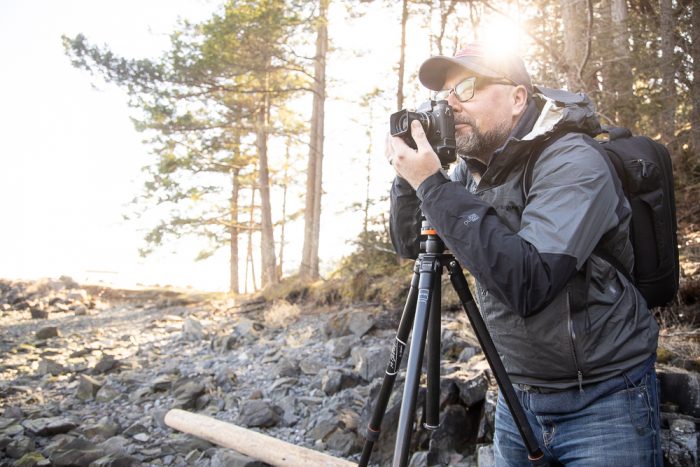“I wish I were more creative.”
I think I hear this more now than ever.
As someone who has made his living first as a comedian, then a photographer and writer for almost 30 years, this confession breaks my heart.
It’s almost always spoken by someone in a way that tells me they’ve given up trying. Like they painted a dodgy horse in art class back in Grade 3 and were told that “not everyone is creative,” and they believed from that moment on that you either have it or you don’t, like freckles, and that they just don’t have it.
But this idea that creativity is something you are, rather than something you do—that it’s either in your genetic code and recognized as talent or it is not—is as toxic as the once popular notion that our creativity lies in the hands of the muses, those ancient Greek goddesses in charge of inspiring artists who got the credit when things went well, though seemed to skip out on the blame when they did not go well. These ideas drown the sparks that would otherwise set minds and hearts aflame, and we can’t afford it; we need your creativity more than ever.
Forget wishing you were more creative. We are all hardwired to be creative. Yes, to make things like books and music and paintings, but also things not so conspicuously artistic. Creative people make vaccinations, invent new software, cook astonishing meals, make wine, make change, and make a difference. They—we—make things. Art. Businesses. Families.
What most of us mean when we make that wish is, instead, “I wish I were creative in the same kind of ways that my songwriter friend is, or like that girl I follow on Instagram who makes sculptures out of turnips.” At the risk of bad-mouthing your Grade 3 art teacher, she truly had no idea.
The question is not “Are you creative?” It’s “How are you creative?”
We are not so much more or less creative than each other as we are differently creative from each other. In nearly three decades of making my living as a so-called creative (we’ll talk some other time about how ham-fisted and wrong-headed it might be to use that word as a noun), I’ve seen the gamut of ways in which people are creative. As I shift more and more to focusing my life on helping people understand and celebrate their own unique creativity and feel less alone in the struggle to be so, I’ve identified three prevailing myths about creativity that we can all do without, especially if you’re one of those people who hasn’t given up and is still hoping you can be “more creative.”
Creativity is not a talent.
Resoundingly the loudest voices, and the ones that should know, tell us that creativity is about doing the work rather than waiting for inspiration or talent to kick in. Picasso testified to this when he said you only find inspiration by working. Painter Chuck Close said “inspiration is for amateurs, the rest of us show up and get to work.” French poet Charles Baudelaire said “inspiration comes of working everyday.”
Can’t draw a horse? How do you know? Because you tried once?
Draw 10 horses a day for the next year and then tell me you can’t draw a horse. Will it be the same horse Picasso might draw? Of course not. But it will be exactly the horse you can draw. Sure, there are a few prodigies out there who are really great the first moment they touch the pen or the piano, but they’re the exception. The rest of us become more creative as we work the kinks out, get more familiar with our tools, and embrace the many failures that teach us our most faithful lessons.
If I had to choose between hard work or talent as a marker for success in any creative pursuit, I’d take the persistent work ethic every time. I might not be “talented,” but I can work. In the long run the results of both begin to look suspiciously the same.
Creativity is not about thinking outside the box.
Just telling me to think outside the box gives me hives. And talk about pressure! I’ll spend more time trying to have original and divergent thoughts than I will trying to solve the problem that thinking outside the box is meant to solve.
The problem is inside the box, so think inside the box; in other words, embrace and work with your constraints, don’t try to overcome them before you do the work. It’s been said that “what’s in the way is the way,” and without getting too Zen with you, there’s wisdom here.
I know we all want to equate creativity with the wild-haired genius in the black turtleneck who comes up with “really creative ideas” but those are usually solutions for problems that don’t yet exist. The rest of us are trying to figure out the end of our novel or solve that home renovation problem, and we have very real constraints. We have budgets and timelines and limits on what we, or our available tools, can accomplish. Do a quick Google search on the benefits of constraints in creative thinking and you’ll see our best and most creative work is done within the box of those constraints, not without it.
In other words: use what you’ve got. It’s enough. That’s where real creativity happens. You can do extraordinary work without massive budgets, and without the latest tools. You are sufficient now.
Creativity is not about great ideas and brilliant first efforts.
Being more creative has nothing to do with the frequency of your epiphanies or how often you get it right on the first try. You don’t have to have it all figured out. Almost nothing in life starts the way it will end up. Bad ideas are only incomplete ideas that haven’t been refined, combined with others, or found their best context. But throw them out before they have a chance and you’ll never see what they might become.
Do you want to be more creative? You’ve got to be willing to fail and start ugly, sometimes really ugly, and figure it out—refine it—as you go. Everything we make is evolutionary. It gets refined with time and effort, sanded smooth with the grit of failures and missteps. It relies on mutation. But if you listen to those voices that tell you it’s not going well, and it’s not going anywhere, and you give up and start again (and again), how will you ever know how creative you really are?
That’s what I’d like to say to those who wish they were more creative: how do you know you aren’t?
You don’t need more natural talent. You don’t need the muses. You don’t need more time or money. And you definitely don’t need to be more like the sculptor with the turnips. You need to be relentlessly you, to choose courage and persistence, to embrace your constraints and do something astonishing with them, to let those first efforts be ugly on their way to being beautiful. The only way to be more creative is to create more. We can all do that.











Read 27 comments and reply